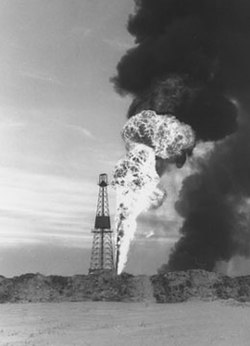| Leduc No. 1 | |
|---|---|
 Leduc #1 well | |
| Type | crude oil discovery in Alberta, Canada |
| Location | Alberta, Canada |
| Nearest city | Leduc County |
| Established | 1990 |
| Built | 1946 |
| Governing body | Parks Canada |
| Website | http://www.canadianenergymuseum.ca/ |
Leduc No. 1 was a major crude oil discovery made near Leduc, Alberta, Canada, on February 13, 1947. It provided the geological key to Alberta's most prolific conventional oil reserves and resulted in a boom in petroleum exploration and development across Western Canada. The discovery transformed the Alberta economy; oil and gas supplanted farming as the primary industry and resulted in the province becoming one of the richest in the country. Nationally, the discovery allowed Canada to become self-sufficient within a decade[citation needed] and ultimately a major exporter of oil.
The discovery followed years of exploratory failures throughout the province. Imperial Oil had spent millions of dollars drilling 133 dry holes in the previous years as only minor discoveries were made. Leduc No. 1 discovered that oil was trapped in what became known as the Nisku Formation and resulted in numerous major discoveries across the prairies. Leduc No. 1 produced 317,000 barrels (50,400 m3) of oil and 323 million cubic feet (9,100,000 m3) of natural gas before it was decommissioned in 1974, and was part of the Leduc-Woodbend oilfield that has produced over 300 million barrels (48,000,000 m3) of oil total.
Billions of investment dollars flowed into Alberta and were followed by massive immigration to the province following the discovery. Alberta's two major cities saw their populations double within a few years. Calgary grew into a major financial centre and within two decades had the highest number of millionaires in Canada, per capita. The provincial capital of Edmonton, immediately northeast of the discovery, became a major petroleum production centre. A farming community with fewer than 900 residents in 1947, Leduc grew to become Alberta's 13th largest city, while several towns, including Devon and Swan Hills, were founded to support workers in the oil and gas industry.